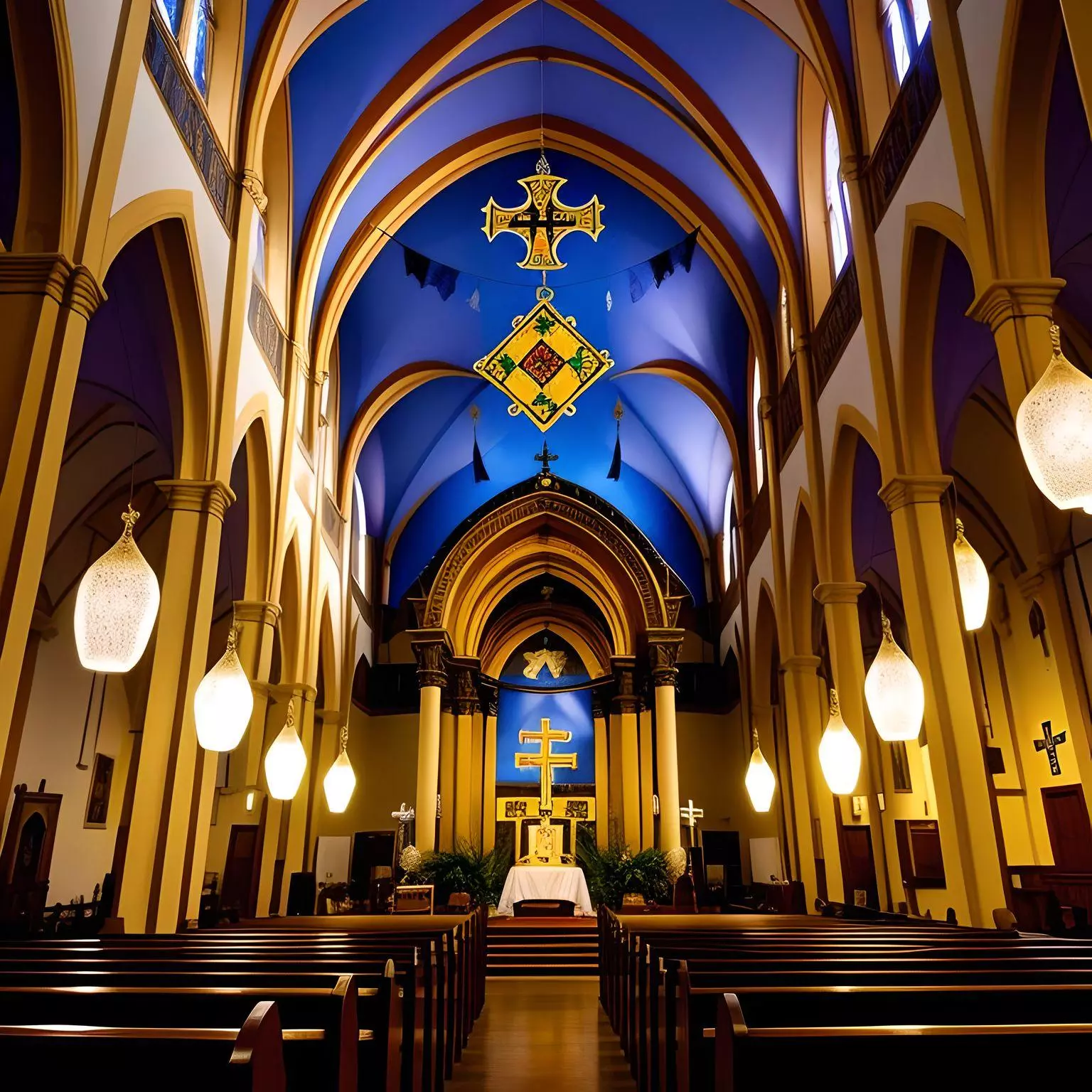I often receive questions from readers on a wide range of topics. One question that comes up frequently is whether tarot cards conflict with Christian beliefs. This complex topic requires an in-depth exploration of both tarot and Christian spirituality. In this article, I will examine the relationship between tarot cards and Christianity to provide a better understanding of this topic.
Key Takeaways:
- The compatibility of tarot cards and Christianity is a complex topic that requires an in-depth exploration.
- In this article, we will examine different perspectives on the relationship between tarot cards and Christian beliefs.
- Both the positive aspects and challenges of incorporating tarot into one’s Christian practice will be discussed.
- Open dialogue and personal reflection are valuable tools for navigating this complex topic.
Understanding Tarot Cards
Tarot cards are a deck of 78 cards that are used for divination, meditation, and spiritual guidance. Each card features unique imagery and symbolism that can be interpreted in different ways, depending on the intention of the reading and the reader’s personal understanding.
While tarot cards have gained a reputation for being associated with witchcraft and the occult, they are not necessarily tied to these practices. In fact, tarot can be used by individuals from all walks of life, including those who identify as Christians.
However, some Christians may be hesitant to explore the world of tarot due to its reputation and perceived conflict with their faith. It is important to note that not all tarot practices are created equal, and there are tarot decks that are specifically designed for Christian readers.
Christian Tarot Decks
Christian tarot decks feature imagery and symbolism that is aligned with Christian spirituality and themes. These decks often include biblical figures, saints, and Christian symbols, making them a suitable option for individuals who wish to incorporate tarot into their Christian practice.
However, it is important to note that while these decks may be more aligned with Christian spirituality, they still use the same foundational principles as traditional tarot decks and may still contain cards that some individuals may find conflicting with their beliefs.
Ultimately, the decision to use tarot for spiritual guidance and growth is a personal one that should be made with careful consideration and discernment. By understanding the origins and purposes of tarot, as well as exploring alternative tarot decks, Christians can make an informed decision about whether or not tarot aligns with their beliefs and practices.
Tarot and Christian Spirituality
One of the questions that often arise when discussing tarot is whether it aligns with Christian spirituality. As a Christian myself, I can understand why this would be a concern. So let’s explore this topic together.
At its core, tarot is a tool for self-reflection and spiritual growth. It can be used to gain insight into oneself and the world around us, and to connect with something greater than ourselves. Many Christians may already recognize the value of these practices in their faith.
However, some may view tarot cards as a form of divination, which goes against biblical teachings. In Deuteronomy 18:10-12, it is written, “There shall not be found among you anyone who… practices witchcraft, or a soothsayer, or one who interprets omens, or a sorcerer, or one who conjures spells, or a medium, or a spiritist, or one who calls up the dead.” This passage has been interpreted by some to include tarot readings.
It’s important to note, however, that tarot readings do not necessarily involve communicating with spirits or seeking supernatural knowledge. Rather, they can simply be a means of gaining insights into oneself and the present moment.
Ultimately, the compatibility of tarot and Christian spirituality is a personal decision. Some Christians may feel that tarot aligns with their faith and can be a valuable tool for personal growth and guidance. Others may feel that it conflicts with their beliefs and choose to avoid it.
Tarot as a Complementary Practice
For those Christians who do find value in tarot, it can be viewed as a complementary practice to their faith. Tarot can help individuals connect with their inner selves and with God, enabling them to better understand and live out their Christian values.
However, it is important to approach tarot with caution and respect. It should never be used as a replacement for prayer, worship, or seeking guidance from religious leaders. Rather, it can be a supplement to these practices, aiding individuals in gaining deeper insights and perspectives.
Ultimately, whether or not tarot aligns with Christian spirituality is a personal decision. It is important to consider your own beliefs and values, as well as seek guidance from trusted religious leaders, when making this decision.
Tarot and Biblical Interpretations
When attempting to integrate tarot into Christian spirituality, it’s essential to examine different interpretations of tarot symbolism and meaning. As a Christian, I personally see the importance of aligning these practices with biblical teachings.
Some Christian interpretations suggest that tarot cards are not inherently evil, but rather that their meaning and effectiveness depend on the intention and spiritual foundation of the practitioner. For example, while some tarot cards may reflect demonic or occult themes, other cards may simply depict universal archetypes or symbols that are neutral in nature.
However, others may view tarot as incompatible with Christianity, citing biblical passages that condemn divination or consulting spirits. It’s important to keep in mind that these passages may have different interpretations, and that these interpretations themselves may vary depending on the individual.
Ultimately, it is up to each Christian to discern how tarot aligns with their own spiritual beliefs. Some may choose to avoid tarot altogether, while others may incorporate it as a tool for self-reflection and personal growth within the framework of their faith.
Tarot and Biblical References
There are a few biblical passages that are often cited in regards to tarot and divination. One of the most well-known is found in Deuteronomy 18:10-12: “There shall not be found among you anyone who… practices witchcraft, or a soothsayer, or one who interprets omens, or a sorcerer.”
While this passage may seem to condemn all forms of divination, it’s important to understand the context in which it was written. At the time, divination was often associated with pagan practices and false prophets, who claimed to have access to secret knowledge beyond what God had revealed to his people.
Another passage, found in Acts 16:16-18, describes a slave girl who had a spirit of divination. Paul commands the spirit to come out of her, after which she is no longer able to prophesy. Some interpret this passage as evidence that divination is incompatible with Christian beliefs, while others argue that it merely demonstrates the power and importance of the Holy Spirit over all other spirits.
Ultimately, interpreting biblical passages in relation to tarot and divination is a complex and nuanced issue. It requires careful study of the relevant scriptures, as well as an understanding of the historical and cultural context in which they were written. As a Christian practitioner of tarot, I believe that it’s important to approach these practices with discernment and humility, and to remain open to the guidance of the Holy Spirit.
Christian Symbolism in Tarot
While tarot cards are not inherently Christian, there are some cards that resonate with Christian symbols and themes. For instance, The High Priestess card can be seen as representing Mary, while The Hierophant can be viewed as symbolizing the Pope or a religious leader. The Wheel of Fortune may be interpreted as representing divine providence, and The Star as symbolizing the hope and faith of the Magi who followed the star to find the Christ child.
However, it is important to note that not all tarot decks may incorporate Christian symbols, and interpretation can vary depending on the reader and their personal beliefs. It is up to the individual to discern which cards resonate with their own spiritual framework.
Tarot and Religious Beliefs
As we discuss the compatibility of tarot and Christianity, it is important to consider how tarot may align or conflict with other religious beliefs. While tarot has its roots in European occultism, it has also been incorporated into various spiritual practices across the world.
In Hinduism, tarot cards may be used for divination purposes alongside other oracle systems. In Buddhism, tarot readings may be utilized as a tool for self-reflection and personal growth. In Wicca, tarot may be seen as a means of communicating with divine energies.
However, there may be other religious beliefs where tarot is not seen as compatible or appropriate. Some Muslims, for example, may view tarot as haram (forbidden) due to its association with divination and the supernatural. Similarly, some forms of Christianity may view tarot as being in conflict with their beliefs.
It is important to note that not all individuals within a religious tradition will hold the same opinion on tarot. While some may view it as being incompatible with their faith, others may see it as a valuable tool for spiritual exploration and growth.
Christian Tarot Practitioners
As a Christian who practices tarot, I can attest to the fact that there are many other Christians who incorporate tarot into their spiritual practice. While some may view it as conflicting with their faith, others see it as a tool that can be used in conjunction with their Christian beliefs.
For me, tarot provides a way to connect with my inner self and gain insight into my life and the world around me. It allows me to explore my spirituality in a deeper way and provides a source of comfort and guidance in times of need.
As with any spiritual practice, it’s important to approach tarot with intention and discernment. I find that incorporating Christian symbolism and prayers into my tarot readings helps me to align it with my faith and maintain a sense of spiritual balance.
Christian Tarot Practitioners’ Perspectives
| Perspective | Explanation |
|---|---|
| Tarot as a tool for spiritual growth | Many Christians view tarot as a way to deepen their spiritual practice, gain self-awareness, and connect with the divine. |
| Aligning tarot with Christian beliefs | Some Christian tarot practitioners incorporate Christian symbolism and prayers into their tarot readings to ensure that it aligns with their faith. |
| Respecting individual beliefs | Christian tarot practitioners acknowledge that tarot may not be for everyone and respect individual’s beliefs and opinions on the matter. |
Ultimately, the decision to practice tarot as a Christian is a personal one. It’s important to approach it with an open mind and heart, and to maintain a sense of discernment and balance when integrating it into your spiritual practice.
Addressing Concerns and Misconceptions
I understand the concerns that may arise when considering the compatibility of tarot and Christianity. It’s important to address some common misconceptions that may exist.
Firstly, tarot is not a religion. It is a tool for spiritual growth and guidance that can be utilized within any belief system. Utilizing tarot cards for personal reflection or meditation does not conflict with one’s Christian faith.
Secondly, tarot cards do not have any inherent power or ability to predict the future. Much like a mirror, tarot cards can reflect back to the individual insights and perspectives that may have been previously hidden or overlooked. This process does not conflict with Christian beliefs.
Thirdly, there are tarot decks that are specifically designed for Christians. These decks utilize Christian symbolism and themes and can align with Christian spiritual beliefs.
It’s important to remember that as Christians, we are called to discernment and personal responsibility for our beliefs and practices. While there may be varied opinions on the compatibility of tarot and Christianity, it ultimately comes down to personal discernment and alignment with one’s own faith.
Finding Personal Balance
As someone who identifies as Christian, exploring the world of tarot can bring up feelings of uncertainty and confusion. It is important to remember that tarot is a tool, and like any tool, it can be used for positive or negative purposes.
One strategy for finding personal balance is to approach tarot with a specific intention or question in mind. This can help to focus the reading and prevent it from straying too far from your spiritual beliefs. Additionally, setting up a sacred space and praying for guidance before beginning a reading can help to create a sense of grounding and connection to your faith.
Another helpful approach is to seek out tarot resources and practitioners who honor and respect your Christian beliefs. There are tarot decks specifically designed for Christians, as well as Christian tarot practitioners who offer readings with a spiritual perspective. Connecting with these resources can provide guidance and support as you navigate the intersection of tarot and Christian spirituality.
It is also important to be mindful of the language and symbolism used in tarot readings. While some cards may resonate with Christian themes and symbols, others may have meanings that conflict with your faith. It is up to each individual to discern what feels aligned with their spiritual beliefs and what does not.
Lastly, remember that personal reflection and open dialogue are key to finding personal balance. It may be helpful to discuss your thoughts and feelings with other Christians who have experience with tarot, or to engage in journaling or meditation as a way to process your thoughts and emotions.
Potential Benefits and Pitfalls
As with any spiritual practice, there are potential benefits and pitfalls to incorporating tarot into one’s Christian spirituality. It is important to approach tarot with an open mind and a discerning heart.
One potential benefit of using tarot as a Christian tool is the opportunity for self-reflection and spiritual growth. Tarot can offer insights into our subconscious thoughts, emotions, and behaviors, allowing us to gain a deeper understanding of ourselves and our relationship with God.
However, there are also potential pitfalls to be aware of. Some Christians may view tarot as a form of divination or fortune-telling, which is condemned in the Bible. It is important to note that tarot should never be used to predict the future or make decisions for us. Instead, it can be used as a tool for guidance and spiritual reflection.
Another potential pitfall is the risk of becoming too reliant on tarot readings for guidance, rather than seeking guidance from God through prayer and meditation. Tarot should never be a substitute for our personal relationship with God.
It is also important to be mindful of the type of tarot deck being used. Some decks may contain imagery or symbolism that conflicts with Christian beliefs, while others may be specifically designed for Christian tarot readings.
Incorporating tarot into one’s Christian practice requires careful discernment and a willingness to explore the potential benefits and pitfalls. It is up to each individual to determine whether tarot aligns with their personal beliefs and spiritual practices.
Conclusion
In conclusion, I have explored the complex relationship between tarot cards and Christianity. While some may view them as conflicting practices, others find ways to incorporate tarot into their Christian spirituality. It is ultimately up to each individual to discern what aligns with their faith.
Throughout this article, we have learned about the history and use of tarot cards, how they relate to Christian spirituality, and potential benefits and pitfalls of incorporating them into one’s practice. We have also explored the perspectives of Christian tarot practitioners and addressed common concerns and misconceptions.
As with any spiritual practice, it is important to approach tarot with an open mind and discernment. Personal reflection and open dialogue can help individuals find a balance between their Christian beliefs and tarot practices.
At the end of the day, whether or not tarot cards are compatible with one’s Christian beliefs is a personal choice. It is my hope that this article has provided valuable insights and considerations for those grappling with this complex topic.
FAQ
Q: Are tarot cards against Christianity?
A: In this section, we will explore the question of whether tarot cards conflict with Christian beliefs.
Q: Understanding Tarot Cards
A: Before delving into the compatibility of tarot and Christianity, let’s first understand what tarot cards are and how they are used in readings. We will also explore whether there are tarot decks specifically designed for Christians.
Q: Tarot and Christian Spirituality
A: In this section, we will examine the relationship between tarot and Christian spirituality. Can tarot be incorporated into one’s Christian practice, or do they conflict with each other?
Q: Tarot and Biblical Interpretations
A: Here, we will discuss different interpretations of tarot cards from a Christian perspective. How do biblical teachings influence the understanding of tarot symbolism and meaning?
Q: Christian Symbolism in Tarot
A: This section will explore the presence of Christian symbolism within tarot cards. Are there cards that resonate with Christian symbols and themes, allowing for a Christian interpretation?
Q: Tarot and Religious Beliefs
A: In this section, we will examine how tarot aligns or conflicts with various religious beliefs beyond Christianity. Do other faiths view tarot in a similar way, or does it have different implications?
Q: Christian Tarot Practitioners
A: Here, we will discuss the perspectives of Christian individuals who practice tarot. Are there Christians who see tarot as a tool for spiritual growth and guidance within the framework of their faith?
Q: Addressing Concerns and Misconceptions
A: This section will address common concerns and misconceptions about the compatibility of tarot and Christianity. We will provide insights and considerations for those grappling with this topic.
Q: Finding Personal Balance
A: How can individuals who identify as Christian navigate the world of tarot while staying true to their faith? This section will explore strategies for finding personal balance and aligning tarot practices with Christian spiritual beliefs.
Q: Potential Benefits and Pitfalls
A: Here, we will discuss the potential benefits and pitfalls that arise when incorporating tarot into one’s Christian spirituality. It is important to consider both the positive aspects and the challenges that may arise.




